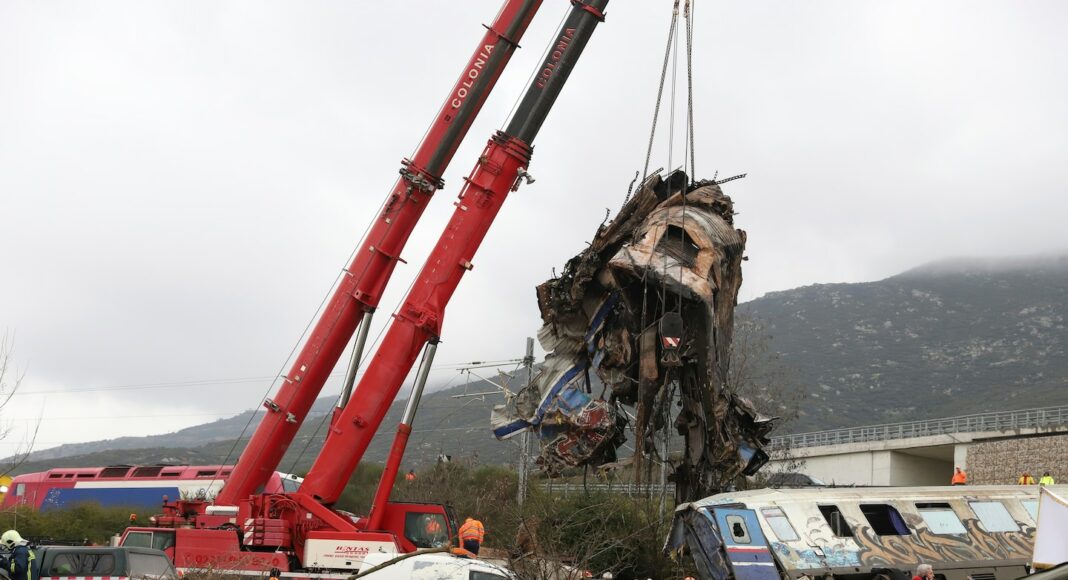Ειδήσεις Ελλάδα

Comment on this story
Comment
ATHENS — Before two trains collided explosively Tuesday — resulting in Greece’s deadliest-ever rail crash, killing at least 57 — they had been on the same tracks for 12 minutes, according to information given to Greek news media.
There was no technical or human intervention to avert the disaster.
As emergency workers on Thursday continued to pick through the charred forward-most carriages, many Greeks were already turning their focus to the causes of the crash, and to a rail system that had long been in worrisome shape.
Train collision in Greece kills at least 43
Though the collision of the passenger train and a freight train had elements of human error — with a station manager arrested and accused of negligence — various officials, as well as a rail union, also connected the incident to a broader set of rail infrastructure problems plaguing a country that still bears the bruises of last decade’s financial crisis.
Greece’s transport minister, who resigned immediately after the crash, said that the country’s rail system “doesn’t befit the 21st century.”
A national federation of railway employees on Thursday held a day-long strike, citing unmet needs for “hiring permanent personnel, better training and, above all, modern safety technology.” Those proposals, the union said, had always ended up “in the trash can.”
Greek police clashed with protesters in Athens the day after two trains collided head on in central Greece on Mar. 1 and killed dozens. (Video: Reuters)
The crash will probably take on a political dimension with Greece — led by a center-right government — poised to hold national elections in the coming months. One of the left-wing Greek newspapers on Thursday blared the headline: “It is not a mistake, it is a crime.”
The passenger train, with about 350 people on board, had been making the trip from Athens to Thessaloniki, Greece’s second-largest city, when it collided with the freight train. Many on board were young people who had been celebrating the raucous carnival holiday, held at last after three years of pandemic interruptions. In an evening briefing Thursday, officials said that 48 people remain hospitalized, with six in intensive care.
Prime Minister Kyriakos Mitsotakis said an independent panel would investigate the causes of the collision and its purview would include looking at the “perennial delays” of rail projects.
Vigils and protests were held Wednesday in Athens and Thessaloniki. In Athens, protesters threw stones at the rail company offices before being dispersed by riot police.
Some of the initial scrutiny centers on the technological safety features of Greece’s rail lines. The Kathimerini newspaper, a major Greek daily, reported that an electronic signaling system — a common safety feature across Europe — had been installed but was not functioning, either because of damage or sabotage, and that efforts to restore the system were long delayed.
In a report last year on rail safety, the European Union said what are known as “train protection systems” are “widely considered one of the most effective railway safety measures for reducing the risk of collisions between trains.” In countries such as Italy and Germany, nearly all tracks have such a system in place. Greece was the only European Union country, the report said, that was entirely without such a safeguard.
Last year, Christos Katsioulis, the president of a committee responsible for works under the European Train Control System, stepped down citing “unfinished maintenance of the railway network.”
He also warned in his resignation letter about potential security issues, saying there will be trains “operating at 200 km/h without any indications of the conditions of the tracks, even a rupture.”
Konstantinos Genidounias, the president of the Association of Greek Train Drivers, told state broadcaster ERT that “nothing works,” including a central monitoring system.
“The light signals don’t work nor does the traffic control system,” he said. “If these worked the drivers would see the red light and the trains would have stopped safely, 500 to 1,000 meters from each other.”
“We have asked. Complained. Nothing works.”
“Everything is dependent on the human factor” as a result, he said. “We are on manual.”
Greece’s infrastructure issues predate its financial crisis, when the country required bailout loans from international and European creditors. But the problems intensified during that period, in tandem with harsh austerity measures. The consulting firm PwC, in a report on Greece’s infrastructure, said that between 2009 and 2019, Greece ranked lowest among E.U. countries in the percentage of its GDP spent on infrastructure, “undermining” its quality.
Greece was also forced to sell off assets as a way to recapitalize its banks, resulting in a wave of privatizations. Greece in 2017 sold its rail company to Italy’s state railways Ferrovie dello Stato for 45 million euros ($48 million).
Before the pandemic, which caused a dramatic drop-off globally in travel, Greece had been one of the few European countries where train use was declining.
But Greece, no longer bound by austerity measures, has tried of late to increase its infrastructure investment. It last year inaugurated a fleet of higher-speed trains that cut the trip between Athens and Thessaloniki from six hours to four.
The Greek collision comes as the United States is in a political firestorm over a trail derailment in East Palestine, Ohio, that did not result in any fatalities but sent toxic chemicals into the air, water and ground.
An initial federal accident report found that, before the derailment, two detectors designed to notice overheated bearings didn’t go off because the temperature hadn’t yet exceeded a threshold set by the railroad. As the train kept moving, a third detector triggered the warning, but it was too late to give the crew enough time to stop before the bearing failed and the train derailed.



